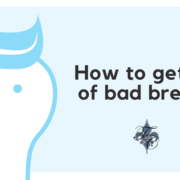How to get rid of bad breath
Do you feel self-conscious about your breath? Bad breath might make us feel awkward in social and professional situations, but the good news is that there are simple things you can do to improve your breath in no time.
Generally speaking, bad breath (also called halitosis), isn’t serious. In many cases it’s caused by poor oral hygiene but it can also be caused by tooth decay, gum disease, and failing restorations.
Causes of Bad breath
The underlying cause of most halitosis is the growth of oral bacteria and leftover food stuck in hard-to-reach areas. However, there are other common contributors to bad breath, which include:
- Certain foods and drinks: Strong-smelling foods such as garlic and onions, as well some dairy products like cheese, along with coffee may be detected on a person’s breath for up to 72 hours after digestion.
- Not flossing: Small particles of food can get stuck between your teeth, just below your gums, and the back teeth that are difficult to reach. When food particles are left behind, they collect bacteria, which in turn causes bad breath and plaque.
- Oral Bacteria: The mouth can harbor obscene amounts of bacteria because it is a warm and moist environment. Moreover, bacterial growth on the tongue accounts for most cases of mouth-related bad breath.
- Smoking: Smoking leaves particles in the throat and lungs. This is typical of nearly any tobacco product that involves inhaling smoke or rolling it around in the mouth. The smell of a freshly smoked cigarette can linger in the lungs for hours, hence the stale scent associated with smoker’s breath
How to Control Bad Breath
Controlling most instances of bad breath can be accomplished with committing to better oral hygiene and certain lifestyle changes.
Oral Hygiene
When it comes to cleaning your teeth and gums, it’s important to dedicate plenty of time to brushing and flossing. For example, it takes about two minutes to thoroughly brush your teeth and soft oral tissue. Adequate brushing involves more than just cleaning your teeth. Since bacteria grows anywhere in the mouth, it’s important to gently brush your tongue, the roof of your mouth, your gums, and the linings of your cheeks. Flossing, like brushing, is an important component of controlling the growth of halitosis-causing bacteria. We recommend using handheld flossers or waxed dental floss to clean hard-to-reach areas. Patients with bridges and implant-supported dentures may want to invest in a water irrigator to keep the gingiva underneath prosthetics debris-free.
Dietary and Lifestyle Changes
If bad breath persists after improving your oral hygiene, consider removing foods like onions and garlic from your diet. If coffee is the cause of your unpleasant breath, consider switching to green tea or caffeinated sparkling water for a breath-friendly energy fix.
Smoking and chewing tobacco greatly contributes to bad breath. Since both of these habits cause a number of serious health problems, quitting as soon as possible makes good sense.
Tooth Decay, Periodontal Disease, and Failing Restorations
Sometimes, halitosis is caused by common dental conditions and old dental work like fillings, inlays, and crowns. Tooth decay and gum (periodontal) disease could be the cause of your unpleasant breath. If you have old dental work, it might be time to get it replaced. Ensuring that your oral health and restorations aren’t the cause of your bad breath involves keeping routine appointments for dental checkups and cleanings.
Our gentle dentist, Dr. Chauvin provides excellent oral healthcare to patients in and around Lafayette, Louisiana. If it’s time for a checkup or cleaning, give our office a call at (337) 234-2186.

